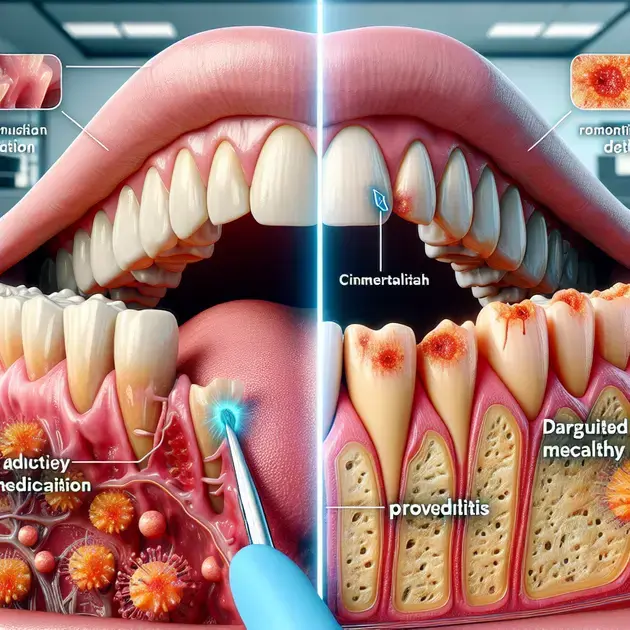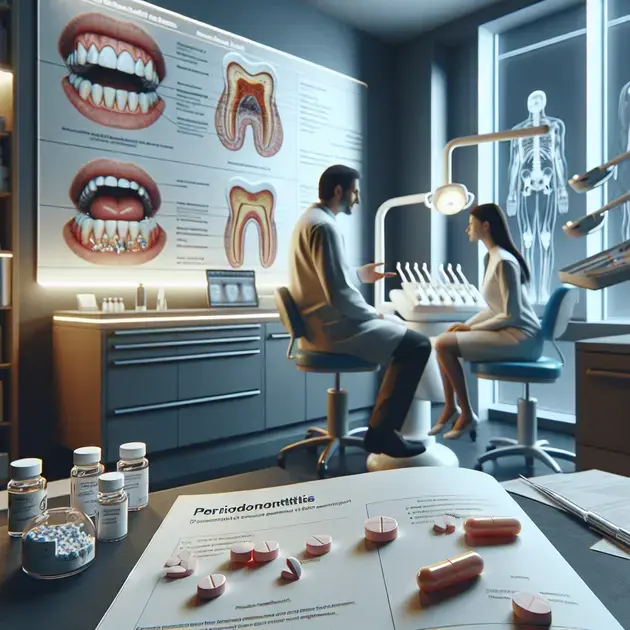When it comes to treating periodontitis, finding an effective medication is crucial for successful outcomes. Periodontitis is a serious gum infection that damages the soft tissue and destroys the bone that supports your teeth. Without proper treatment, periodontitis can lead to tooth loss and other health complications.
Fortunately, there are several medications available that have been proven to be effective in treating periodontitis. From antibiotics to antimicrobial mouth rinses, these medications can help control the infection, reduce inflammation, and promote healing of the gums. In this post, we will discuss some of the most common and effective medications for periodontitis treatment and how they can benefit patients in their oral health journey.

Treating Periodontitis with Effective Medication
Periodontitis is a serious gum infection that damages the soft tissue and destroys the bone that supports your teeth. To effectively treat periodontitis, medication can be a crucial component of a comprehensive treatment plan. Here is a step-by-step guide on how to effectively use medication to treat periodontitis:
1. Consult with a Periodontist:
Before starting any medication for periodontitis, it is essential to consult with a periodontist. A periodontist is a dentist who specializes in the prevention, diagnosis, and treatment of periodontal disease. They will assess the severity of your condition and recommend the most appropriate medication for you.
2. Antibiotics Prescription:
In some cases, antibiotics may be prescribed to help control bacteria that cause periodontitis. Your periodontist may recommend antibiotics such as doxycycline or metronidazole. These antibiotics can help reduce inflammation and fight off infection in the gums.
3. Antimicrobial Mouthwash:
Using an antimicrobial mouthwash can also be beneficial in treating periodontitis. Mouthwashes containing chlorhexidine or essential oils can help reduce plaque and gingivitis, which are precursors to periodontitis. Rinse your mouth with the antimicrobial mouthwash as directed by your periodontist.
4. Follow a Good Oral Hygiene Routine:
Medication alone is not enough to treat periodontitis effectively. It is crucial to follow a good oral hygiene routine, including brushing your teeth twice a day, flossing daily, and using an antiseptic mouthwash. These practices can help prevent the progression of periodontitis.
5. Regular Follow-Ups:
After starting medication for periodontitis, it is important to have regular follow-up appointments with your periodontist. During these appointments, your periodontist will monitor the progress of your treatment, make any necessary adjustments to your medication, and provide guidance on maintaining good oral health.
The Importance of Effective Medication for Periodontitis
Effective medication plays a crucial role in the treatment of periodontitis, a severe gum infection that can lead to tooth loss if left untreated. Understanding the importance of using medication for periodontitis can help individuals manage their condition effectively. Here are key points highlighting the significance of effective medication for periodontitis:
1. Controlling Bacterial Infection:
Medication for periodontitis helps control the bacterial infection that contributes to the development and progression of the disease. Antibiotics and antimicrobial agents target the harmful bacteria in the gums, reducing inflammation and preventing further damage to the supporting structures of the teeth.
2. Supporting Tissue Healing:
Effective medication promotes tissue healing in the gums affected by periodontitis. By reducing inflammation and fighting off infection, the medication aids in the regeneration of healthy gum tissue and prevents the continued destruction of the bone surrounding the teeth.
3. Preventing Tooth Loss:
One of the primary goals of medication for periodontitis is to prevent tooth loss. By controlling the infection, reducing inflammation, and promoting tissue healing, medication can help stabilize the condition of the gums and prevent the need for tooth extraction due to severe periodontal disease.
4. Improving Treatment Outcomes:
When used in conjunction with other periodontal treatments, effective medication can improve the overall outcomes of periodontitis therapy. Combining medication with scaling and root planing, surgical interventions, and maintenance care can enhance the success of the treatment and long-term management of the disease.
5. Enhancing Quality of Life:
By effectively managing periodontitis with medication, individuals can improve their oral health and overall quality of life. Reduced pain and discomfort, improved gum health, and preservation of natural teeth contribute to a better oral function and overall well-being.
Benefits of Using Medication for Periodontitis Treatment
Utilizing medication as part of the treatment plan for periodontitis offers numerous benefits that can help individuals effectively manage their condition and preserve their oral health. Understanding the advantages of using medication for periodontitis treatment is essential for making informed decisions about your dental care. Here are some key benefits of incorporating medication into the treatment of periodontitis:
1. Targeted Bacterial Control:
Medication for periodontitis specifically targets the bacteria responsible for causing the gum infection. This targeted approach helps eliminate harmful bacteria, reduce inflammation, and prevent the progression of the disease, promoting better gum health and supporting the success of periodontal treatment.
2. Non-Invasive Treatment Option:
Using medication as part of the treatment plan for periodontitis is a non-invasive option that can be beneficial for individuals who prefer to avoid surgical interventions. Antimicrobial agents, antibiotics, and mouthwashes offer effective alternatives to more invasive procedures, providing relief from symptoms and promoting gum healing.
3. Convenience and Accessibility:
Medication for periodontitis is readily available and easy to use, making it a convenient treatment option for individuals with busy lifestyles. Whether in the form of oral tablets, mouthwashes, or gels, medication can be integrated into daily oral hygiene routines with minimal disruption, ensuring consistent and effective treatment.
4. Comprehensive Treatment Approach:
Incorporating medication into the comprehensive treatment approach for periodontitis allows for a multi-faceted strategy to address the various aspects of the disease. By combining medication with professional cleanings, periodontal procedures, and at-home oral care, individuals can benefit from a holistic approach to managing their condition.
5. Long-Term Maintenance Benefits:
Continuous use of medication as part of the long-term maintenance plan for periodontitis can help prevent disease recurrence and maintain optimal oral health. By following the prescribed medication regimen and attending regular dental check-ups, individuals can sustain the benefits of treatment and reduce the risk of future complications.

The Advantages of Opting for Effective Medication for Gum Disease
When it comes to treating gum disease, opting for effective medication can provide several advantages. One of the main benefits is the ability to target the root cause of the issue, whether it be bacteria buildup, inflammation, or other contributing factors. By using medication specifically designed to combat gum disease, patients can experience faster and more successful treatment outcomes.
Another advantage of choosing effective medication for gum disease is the potential for reduced pain and discomfort during the treatment process. Medications can help alleviate symptoms such as swelling, bleeding, and sensitivity, making the overall experience more manageable for patients. Additionally, some medications may also promote faster healing and tissue regeneration, leading to improved oral health in the long run.
By targeting gum disease with the right medication, patients can also prevent the condition from worsening and causing more serious complications. Effective medication can help halt the progression of gum disease, protecting the teeth and surrounding tissues from further damage. This proactive approach to treatment can ultimately save patients time, money, and potential discomfort in the future.
Overall, opting for effective medication for gum disease can lead to improved oral health, reduced symptoms, and better long-term outcomes. Consulting with a dental professional to explore medication options tailored to individual needs is crucial for successfully treating gum disease.
Exploring Different Treatment Options for Periodontitis
Periodontitis is a serious form of gum disease that requires tailored treatment to effectively manage and improve the condition. There are various treatment options available for periodontitis, each with its own advantages and considerations. One common approach is scaling and root planing, a deep cleaning procedure that removes plaque and tartar from below the gumline and smooths the roots to prevent bacterial buildup.
Another treatment option for periodontitis is antibiotic therapy, which involves the use of medications to target and eliminate bacteria causing the infection. Antibiotics may be prescribed in various forms, including mouth rinses, gels, or oral tablets, depending on the severity of the condition. This treatment approach can help reduce inflammation, control infection, and promote healing of the gum tissues.
In more advanced cases of periodontitis, surgical interventions such as flap surgery or bone grafting may be necessary to address deep pockets and bone loss. These procedures aim to restore the supportive structures of the teeth and gums, improving overall oral health and preventing further damage. Surgical treatments for periodontitis are typically performed by periodontal specialists to ensure optimal outcomes.
Exploring different treatment options for periodontitis with the guidance of a dental provider can help patients determine the most suitable approach based on their unique needs and the severity of their condition. By addressing periodontitis promptly and effectively, individuals can preserve their oral health and prevent complications associated with advanced gum disease.
Enhancing Periodontitis Recovery with Targeted Medication
Targeted medication can play a crucial role in enhancing the recovery process for individuals dealing with periodontitis. By using medications specifically formulated to address the underlying causes of the condition, patients can support healing, reduce inflammation, and prevent reinfection. These targeted medications can complement other treatment modalities, such as professional cleanings and maintenance therapy, to optimize recovery outcomes.
One advantage of using targeted medication for periodontitis recovery is the ability to deliver concentrated doses of active ingredients directly to the affected areas. This targeted approach can help penetrate deep into the gum tissues, effectively combating bacteria and promoting tissue regeneration. As a result, patients may experience faster healing and improved overall oral health following treatment.
Additionally, targeted medication for periodontitis can help manage symptoms such as pain, swelling, and sensitivity during the recovery process. By reducing discomfort and enhancing comfort levels, patients can better adhere to their treatment plan and maintain good oral hygiene practices. This comprehensive approach to periodontitis recovery can lead to better outcomes and long-term oral health benefits.
Consulting with a dental professional to determine the most appropriate targeted medication for periodontitis recovery is essential for maximizing the effectiveness of treatment. By incorporating targeted medication into a comprehensive periodontal care plan, individuals can support their recovery journey and achieve a healthy, sustainable smile.
Conclusion
Choosing effective medication for gum disease offers multiple advantages, including targeting the root cause of the issue, reducing pain and discomfort, and preventing the condition from worsening. By utilizing medication tailored for gum disease, patients can achieve faster treatment outcomes and improved oral health in the long term. Consulting with a dental professional to explore personalized medication options is vital in successfully managing gum disease.
When it comes to addressing periodontitis, exploring different treatment options such as scaling and root planing, antibiotic therapy, or surgical interventions can help individuals effectively manage the condition based on its severity and unique needs. By promptly and effectively treating periodontitis, individuals can safeguard their oral health and prevent complications associated with advanced gum disease.
Enhancing periodontitis recovery with targeted medication plays a crucial role in supporting healing, reducing inflammation, and managing symptoms during the recovery process. The concentrated doses of active ingredients in targeted medication can penetrate deep into the gum tissues, combat bacteria, and promote tissue regeneration, leading to improved oral health outcomes. Incorporating targeted medication into a comprehensive periodontal care plan under the guidance of a dental professional can help individuals achieve a healthy and sustainable smile.



